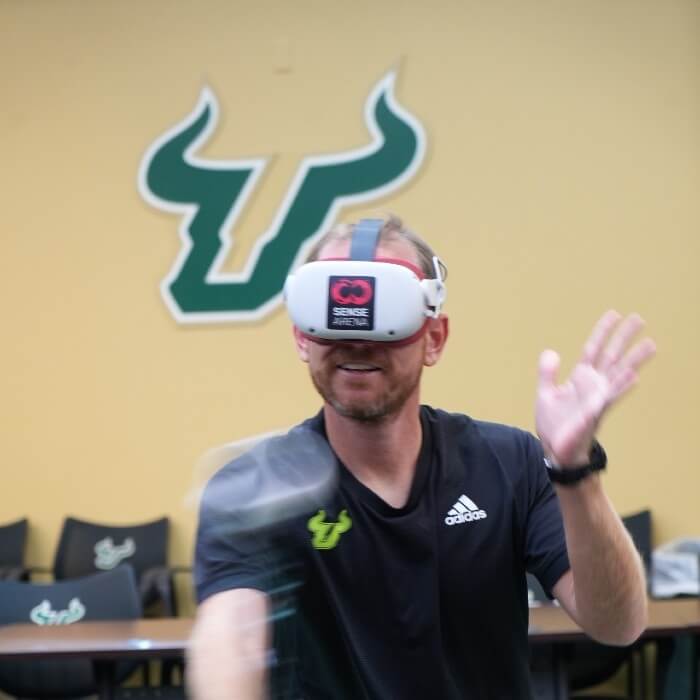College Feature
USF, Sense Arena Partner with Cognitive Virtual Reality Training
by Rhiannon Potkey, 13 March 2023
| Share: |  |
|  | |
|
|
University of South Florida women’s coach Cristina Moros is always looking for ways to help her players improve without the wear-and-tear that comes with constant practice time on the court.
Once she learned about Sense Arena for Tennis, a cognitive virtual reality training system, she was intrigued.

USF Men's Coach Ashley Fisher Tries Sense Arena's Program
© Sense Arena
Before asking her players to give it a chance, Moros tested it herself.
“I was shocked at how real it feels,” Moros said. “We talk all the time about just kind of getting reps that they need without physically exerting themselves so much. To me, that is a huge benefit. They have drills where you have to make a quick decision and think in a split second on where to hit the ball and I think it’s so important for our players to learn the timing and all of that. It’s a huge game-changer.”
The USF men’s and women’s teams are the first NCAA tennis programs to partner with Sense Arena, a sports virtual reality company headquartered in Prague, Czech Republic. Yannick Yoshizawa, Sense Arena’s Vice President of Tennis, played at USF.
Players from the USF programs will be able to supplement their on-court training by using Sense Arena’s VR technology, which operates via the Meta Quest 2 and provides players with enhanced visualization tools geared towards improving the mental aspects of the game like anticipation and decision-making skills.
“The ability to see improvements is big, because with a lot of drills and exercises you can definitely see improvements over time,” said USF assistant men’s coach Jonathan Wolff. “The guys will have their own profiles and we can make it a little bit of a healthy competition.”
Sense Arena for Tennis launched in November 2022 and is backed by high-profile tennis figures, including Hall of Famer Martina Navratilova, ATP pros Gonzalo Escobar, Miomir Kecmanovic, Emil Ruusuvuori and Jack Sock, and WTA pros Jennifer Brady, Marie Bouzkova, Brenda and Linda Fruhvirtova, Liudmila Samsonova, Daria Saville and Luisa Stefani.
While the partnership announcement with USF is Sense Arena’s first in NCAA tennis, the company launched its ice hockey product in 2018 and has 10 NCAA Division I hockey programs using the technology.
The women’s players at USF have already started using the virtual reality training while the men’s team plans to implement the training soon.
“I think some naturally have bought into it a little bit more than others, at least in the beginning,” Moros said. “It is not something we are mandating just yet. But we’ve already had a few girls working on it and doing it on their own.”
The players have used the training program the night before a match or a few hours before taking the court. The programs are hoping to bring the training on the road to use in hotel rooms during their down time.
“Being able to not only see yourself performing out there on the court, but also go through shadow strokes and movement with the technology is exciting,” Wolff said. “It kind of tricks your body in a sense with some of the muscle movements and the way you want to perform out there.”
For Moros, the decision to add cognitive reality training was a “no brainer” as college programs in all sports continue to strive for a more holistic approach to helping players improve on all levels.
“We talk so much about visualization, and I think the past few years the trend has been training our girls on not just the physical things but the mental things as well,” Moros said. “This is kind of an obvious transition moving forward in that realm, along with mental toughness and working with our performance coach.”